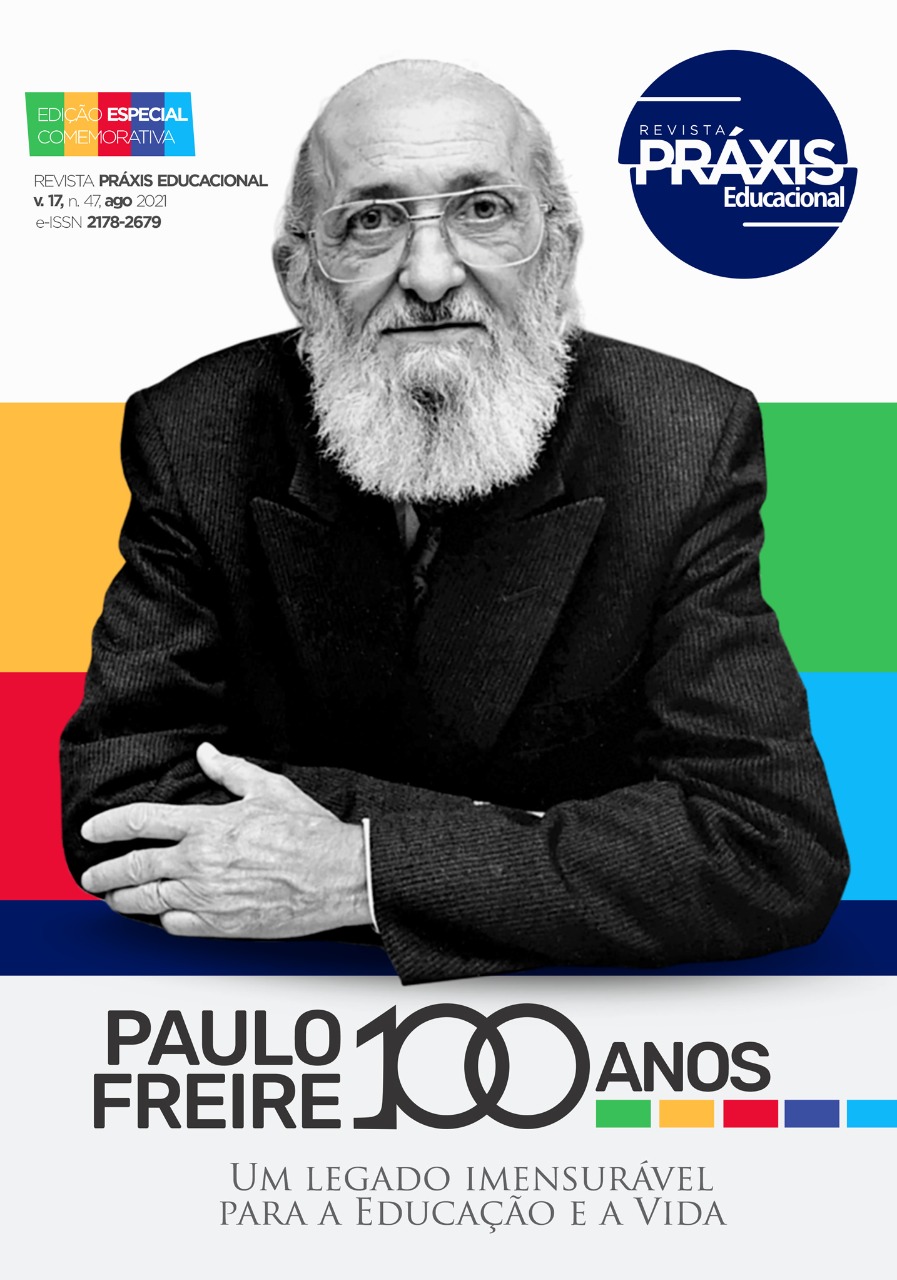Notes about an intellectual relationship: Paulo Freire and Frantz Fanon
DOI:
https://doi.org/10.22481/praxisedu.v17i47.8457Keywords:
Fanon, Freire, postcolonialAbstract
In this writing I analyze the intellectual relationship that Paulo Freire establishes with Frantz Fanon. I consider three key works: Education as a practice of freedom (FREIRE, 1967), Pedagogy of the oppressed (FREIRE, 1970) and The condemned of the earth (FANON, 1961). I take postcolonial criticism as an exercise of suspicion (HALL, 2008; CATELLI and DE OTO, 2018), as a way of talking about the mark that colonialism imposed on our subjectivities, in our ways of knowing, educating, doing, playing and feeling, and that last beyond the initial moment of conquest. Many of our contemporary questions and responses are marked by the silence of a colonial past (AÑON and RUFER, 2018) that insists and runs through our memories and corporeality. A specific historical moment (complex and differentiated) linked to the conquest and colonization of territories and their people, but also, a way of orchestrating or narrating a story, and a description framed within a Eurocentric theoretical paradigm, which defines truths and pretends to produce unique identities. A modern history, a knowledge and a power that became universal and designates a complex web of practices, from symbolic to material, destined to guarantee the subordination of various social groups. Its face denied coloniality shows us how in these processes of production of subjectivity specific combinations of race, patriarchy, gender, and class are presented (GÜIMARAES, 2009; QUIJANO, 2000; TROUILLOT, 2011; MBEMBE, 2016).
Downloads
References
AÑON, Valeria y RUFER, Mario Añon, 2018. “Lo colonial como silencio, la conquista
como tabú: reflexiones en tiempo presente”. Tabula Rasa, (29), 2018, pp.107-131.
CATELLI, Laura y DE OTO, Alejandro y RUFER, Mario. Tabula Rasa, (29), Introducción: pensar lo colonial. Tabula Rasa, (29), 2018, pp. 11-18.
Doi: https://doi.org/10.25058/20112742.n29.01
DERRIDA, Jacques. “Mal de Archivo. Una impresión freudiana”. Conferencia en Coloquio internacional Memory: The Question of Archives. Société ínternationale d’Histoire de la Psychiatrie et de la Psychanalyse, del Freud Museum y del Courtauld Institute of Art, 1994
http://redaprenderycambiar.com.ar/derrida/textos/mal+de+archivo.htm
FANON, Frantz Piel. Sociología de una revolución. Trad. Víctor Flores Olea, México: ERA, (1959) 1976.
_______. Negras máscaras blancas. Buenos Aires: Abraxas, (1951) 2009.
_______. Los Condenados de la Tierra. Buenos Aires: Fondo de Cultura Económica, (1961) 1973
Autor/a. 2016.
FREIRE, Paulo. “Acción cultural”. FERRÉ Methol (entrevistador), Víspera: Montevideo, Año 3, Vol 10, Mayo de 1969, pp. 23-28.
_______. Pedagogía del oprimido. Buenos Aires: Tierra Nueva, 1970.
_______. La educación como práctica de la libertad. Buenos Aires: Siglo XXI, (1967)
_______. Cartas a Guinea Bissau. México: Siglo XXI, (1977) 2000. ―. Pedagogía de la
esperanza. México: Siglo XXI, (1992) 1999.
_______. Pedagogía do oprimido (o manuscrito). José E. ROMÃO, Moacir GADOTTI y Jason FERREIRA (org.). São Paulo: Ed,L coedição UNINOVE e Ministerio de Educação do Brasil, 2013.
GROSFOGUEL, Ramón ¿Negros marxistas o marxismos negros?: una mirada descolonial. Tabula Rasa, (28), 2018, 11-22. Doi: https://doi.org/10.25058/20112742.n28.1
GUIMARÃES, Antonio Sergio A. Racismo e Antirracismo no Brasil. Sao Paulo: Editora 34, 1999.
_______. Frantz Fanon's reception in Brazil. Lusotopie, Volume 16, Number 2, 2009, pp. 157-172.
HALL, Stuart. ¿Cuándo fue lo postcolonial? VV. AA. Estudios postcoloniales. Ensayos fundamentales. Madrid: Traficantes de Sueños, 2008.
RIBEIRO SANCHES, Manuela (org) Malhas que os impérios tecem. Textos anticoloniais, contextos pós-coloniais. Coimbra: Edições 70, 2011.
ROMÃO, José Eustaquio, Primera parte. En Paulo Freire e Amílcar Cabral. Razões Revolucionárias e a descolonização das mentes. São Paulo:Editora e Livraria Paulo Freire, 2012.
SAID, Eduard. Teoría viajera reconsiderada. En Cuadernos de teoría crítica I. Teoría viajera. Valparaíso, 2015, pp. 43-62.
WALSH, Catherine. Pedagogías decoloniales. Prácticas insurgentes de resistir, (re) existir y (re) vivir. Quito: Abya Yala. 2013.
Downloads
Published
Issue
Section
License
Copyright (c) 2021 Práxis Educacional

This work is licensed under a Creative Commons Attribution-ShareAlike 4.0 International License.
Você é livre para:
Compartilhar - copia e redistribui o material em qualquer meio ou formato; Adapte - remixe, transforme e construa a partir do material para qualquer propósito, mesmo comercialmente. Esta licença é aceitável para Obras Culturais Livres. O licenciante não pode revogar essas liberdades, desde que você siga os termos da licença.
Sob os seguintes termos:
Atribuição - você deve dar o crédito apropriado, fornecer um link para a licença e indicar se alguma alteração foi feita. Você pode fazer isso de qualquer maneira razoável, mas não de uma forma que sugira que você ou seu uso seja aprovado pelo licenciante.
Não há restrições adicionais - Você não pode aplicar termos legais ou medidas tecnológicas que restrinjam legalmente outros para fazer qualquer uso permitido pela licença.












